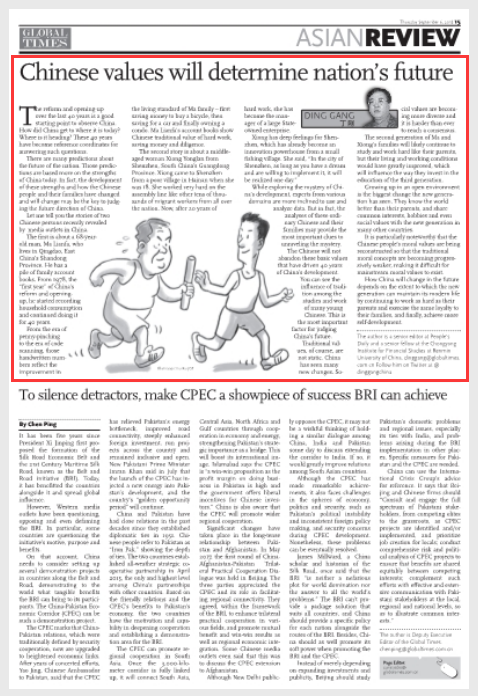Global Governance
Your Present Location: PROGRAMS> Global GovernanceDing Gang: Chinese values will determine nation’s future
By Ding Gang Source: Global Times Published: 2018-9-5
The reform and opening-up over the last 40 years is a good starting point to observe China. How did China get to where it is today? Where is it heading? These 40 years have become reference coordinates for answering such questions.

There are many predictions about the future of the nation. Those predictions are based more on the strengths of China today. In fact, the development of these strengths and how the Chinese people and their families have changed and will change may be the key to judging the future direction of China.
Let me tell you the stories of two Chinese persons recently revealed by media outlets in China.
The first is about a 68-year-old man, Ma Lianfa, who lives in Qingdao, East China's Shandong Province. He has a pile of family account books. From 1978, the "first year" of China's reform and opening-up, he started recording household consumption and continued doing it for 40 years.
From the era of penny-pinching to the era of code scanning, those handwritten numbers reflect the improvement in the living standard of Ma family - first saving money to buy a bicycle, then saving for a car and finally owning a condo. Ma Lianfa's account books show Chinese traditional value of hard work, saving money and diligence.
The second story is about a middle-aged woman Xiong Yonglan from Shenzhen, South China's Guangdong Province. Xiong came to Shenzhen from a poor village in Hainan when she was 18. She worked very hard on the assembly line like other tens of thousands of migrant workers from all over the nation. Now, after 20 years of hard work, she has become the manager of a large State-owned enterprise.
Xiong has deep feelings for Shenzhen, which has already become an innovation powerhouse from a small fishing village. She said, "In the city of Shenzhen, as long as you have a dream and are willing to implement it, it will be realized one day."
While exploring the mystery of China's development, experts from various domains are more inclined to use and analyze data. But in fact, the analyses of these ordinary Chinese and their families may provide the most important clues to unraveling the mystery.
The Chinese will not abandon these basic values that have driven 40 years of China's development. You can see the influence of tradition among the studies and work of many young Chinese. This is the most important factor for judging China's future.
Traditional values, of course, are not static. China has seen many new changes. Social values are becoming more diverse and it is harder than ever to reach a consensus.
The second generation of Ma and Xiong's families will likely continue to study and work hard like their parents, but their living and working conditions would have greatly improved, which will influence the way they invest in the education of the third generation.
Growing up in an open environment is the biggest change the new generation has seen. They know the world better than their parents, and share common interests, hobbies and even social values with the new generation in many other countries.
It is particularly noteworthy that the Chinese people's moral values are being reconstructed so that the traditional moral concepts are becoming progressively weaker, making it difficult for mainstream moral values to exist.
How China will change in the future depends on the extent to which the new generation can maintain its modern life by continuing to work as hard as their parents and exercise the same loyalty to their families, and finally, achieve more self-development.
The author is a senior fellow at the Chongyang Institute for Financial Studies at Renmin University of China.























































































 京公网安备 11010802037854号
京公网安备 11010802037854号





